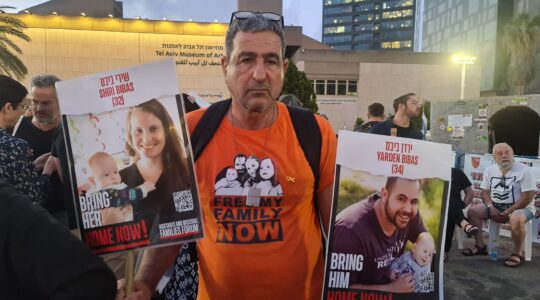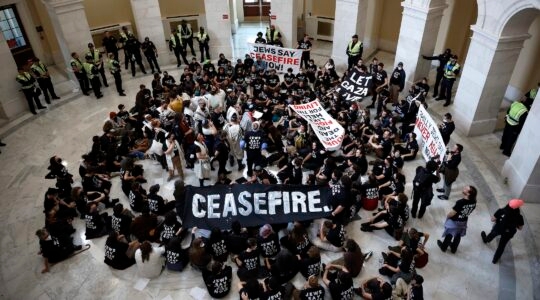TEL AVIV (JTA) – The more than century-old debate over how to abide – or, some might say, circumvent – the biblical injunction to let the land of Israel lie fallow every seven years turned into a showdown this year between Israel’s fervently Orthodox and religious Zionist camps.
The matter came to a head when the Chief Rabbinate, increasingly influenced by fervently Orthodox elements, decided that it would not give blanket authorization this year to a time-worn loophole permitting Jewish farmers to sell their land symbolically to non-Jews in order to continue farming it themselves.
Instead, the Chief Rabbinate allowed the rabbis of local municipalities to decide whether or not to sanction the practice, known as “heter mechira,” in their communities.
A group of farmers filed an appeal of the decision to the Supreme Court, and on Wednesday the court found in the petitioners’ favor, ordering the Chief Rabbinate to replace any municipal rabbi refusing to sanction the heter mechira practice.
The Chief Rabbinate’s ruling had created widespread uncertainty over what produce was considered kosher.
Without approval of heter mechira and the vital kosher authorization that goes with it, Israel’s agricultural sector stood to lose tens of millions of dollars.
Not only were farmers affected, but the entire industry of produce export companies, packing plants, truck drivers, restaurants, caterers and supermarkets were suffering.
A few shops had even lost their kosher certification for selling produce not sanctioned by the rabbis.
Some argue that the issue was not merely a difference in interpretation of Jewish law but another chapter in the longstanding feud between Israel’s religious Zionists and fervently Orthodox Jews, or haredim, over how to approach the realities of a Jewish state.
“The story is not shmita,” said Bar-Ilan University sociologist Menachem Friedman, an expert on Israel’s religious communities, using the Hebrew word for sabbatical year. “The story is Zionism – a confrontation between Zionism and the haredi world. And the question is if the Jewish state can survive without a real and vital agricultural economy.”
For Eyal Yisraeli, who owns a company in Moshav Yanov, not far from Netanya, that sells leafy green vegetables and mushrooms to 1,200 restaurants and caterers across Israel, the confusion over shmita threatened to ruin his business.
The cities whose rabbis have rejected the heter mechira loophole constitute a major part of his business, and Yisraeli said he does not understand why the same lettuce he sells to a hotel in Tel Aviv was considered unkosher in Herzliya, just a few miles away.
Yisraeli was among those who petitioned the Supreme Court to overturn the Chief Rabbinate’s ruling on the heter mechira loophole. The court’s decision was heralded by petitioners like Yisraeli.
“When you have the authority of the state behind you,” Yisraeli said of the Chief Rabbinate, “you have a responsibility to the public.”
For those who do not abide by the heter mechira loophole, only fruits and vegetables grown abroad or raised by non-Jews – including Israeli Arabs and Palestinians – are deemed kosher. Also considered kosher is Otzar Beit Din produce, where legal maneuvering assigns ownership to a religious court and farmers are paid for their labor.
The price of such produce usually is twice the going rate for heter mechira goods.
Twelve rabbis, including those from major cities such as Jerusalem and Petach Tikvah, had refused to sanction the loophole. After Wednesday’s court decision, it appears they will have to reverse their policies.
The Tzohar organization, a group of religious Zionist rabbis, had threatened to break off from the Chief Rabbinate and issue its own kosher authorization for produce grown by Jewish farmers in Israel during the shmita year. This would have enabled farmers to keep all their customers, and consumers could buy produce at regular market prices.
These rabbis argued that Jewish agriculture in Israel must be bolstered, and they condemned the Chief Rabbinate’s decision to offer local rabbis the option of rejecting the heter mechira loophole.
Rabbi David Stav, a member of Tzohar, charges that the fervently Orthodox elements in the Chief Rabbinate are interested only in the interests of their own community, which generally rejects use of the heter mechira loophole, rather than the interests of the country at large, including farmers.
“They are destroying the Chief Rabbinate and destroying Judaism in Israel,” Stav said.
Haredi rabbis who sit on the Chief Rabbinate’s governing council counter that it is the religious Zionist rabbis who are stirring up trouble. The haredim suggest the Zionists’ maverick actions are endangering the whole religious establishment.
“They are looking for an excuse to make noise,” said Rabbi Moshe Rachverger, a haredi member of the Chief Rabbinate’s governing council.
Rachverger dismissed the idea of creating an alternative kosher authority.
“This would mean the collapse of kashrut in all of Israel,” he said. “Even the Conservative and Reform movements would want to give their own authorizations, and kashrut would cease to have any meaning.”
Shmulik Greenberg, a spokesman for Knesset member Moshe Gafni of the fervently Orthodox United Torah Judaism party, insisted the issue was not about old feuds but adherence to Torah law.
“It’s a mitzvah from the Torah; we need to fulfill it,” Greenberg said. “There is no war here with a victor and a loser. This is just about our desire to live according to halacha,” or Jewish law. “Every seven years the land deserves a rest.”
The biblical injunction to let farmland lie fallow every seventh year is considered among Judaism’s most humane and environmentally friendly laws, honoring the importance of giving the earth time to rejuvenate and the poor to share in its abundance.
“Six years you shall sow your land and gather in its yield. But in the seventh you shall let it rest and lie fallow,” it reads in Exodus 23:10-11. “Let the needy among your people eat of it, and what they leave let the wild beasts eat. You shall do the same with your vineyards and olive groves.”
In the modern State of Israel, where agriculture is one of the state’s ideological underpinnings — if not an economic one — the injunction long has been a difficult part of Jewish law to accommodate.
When modern Jewish farming settlements began to appear in Palestine at the end of the 19th century, farmers pleaded with rabbis for a way to circumvent the shmita conundrum.
It was then that the heter mechira concept was approved. Later it was also accepted by the father of religious Zionism, Rabbi Abraham Isaac Kook, who eventually became the first Ashkenazi chief rabbi in prestate Israel.
“The more extreme elements protested and attacked Rabbi Kook, and since then Rabbi Kook has been seen by the haredim as someone who was willing to serve secular Zionism,” said Friedman, the sociologist.
In reversing the blanket approval of the heter mechira loophole, Israel’s current Ashkenazi chief rabbi, Yona Metzger, was “spitting in the face of Rabbi Kook,” Friedman said.
The haredim “see this as the expression of a historic victory,” Friedman explained. “In a sense they see themselves correcting the ‘incorrect’ approach of Rabbi Kook.”
Wednesday’s Supreme Court decision appears to have reversed that “correction.”
JTA has documented Jewish history in real-time for over a century. Keep our journalism strong by joining us in supporting independent, award-winning reporting.





